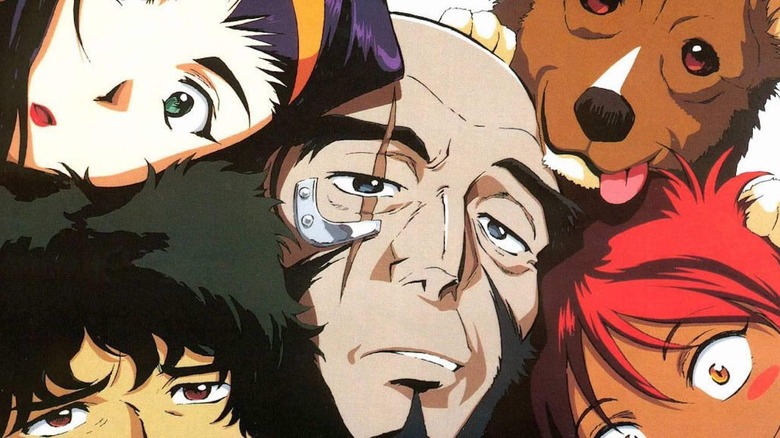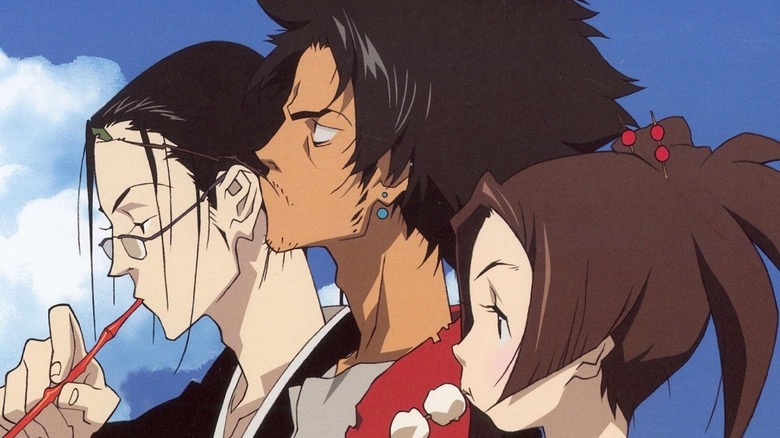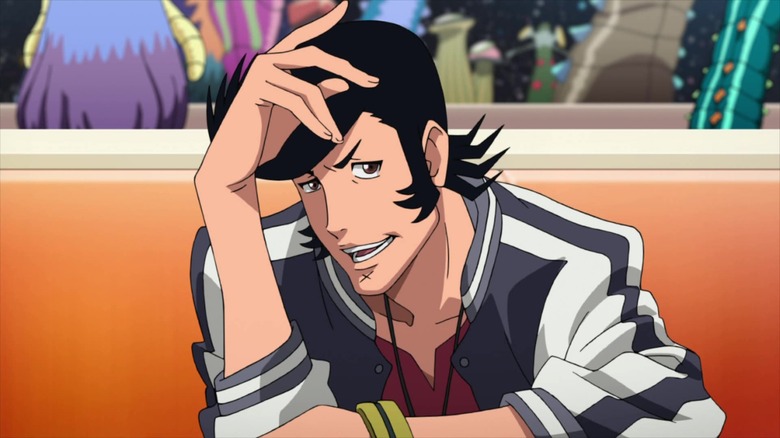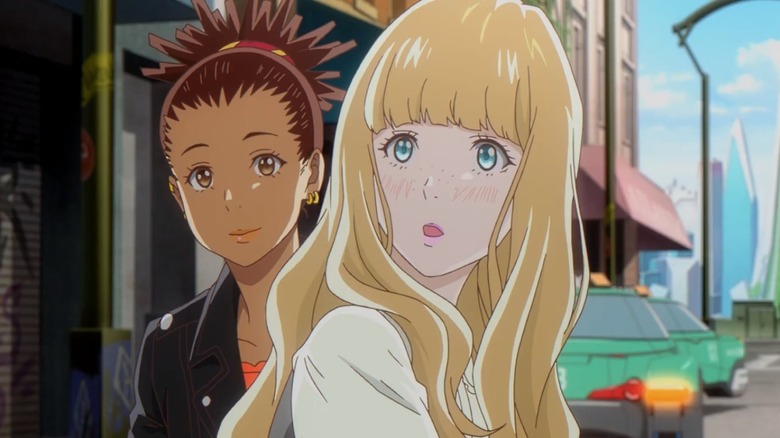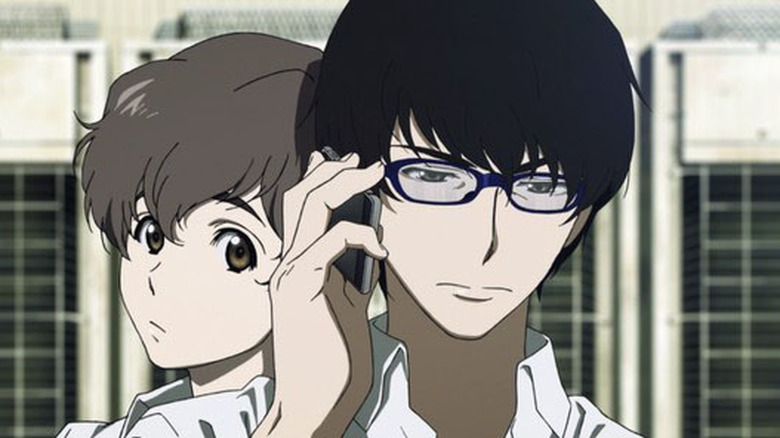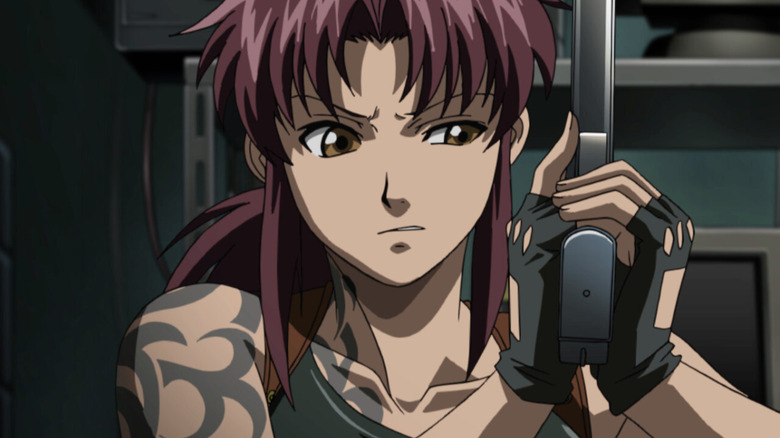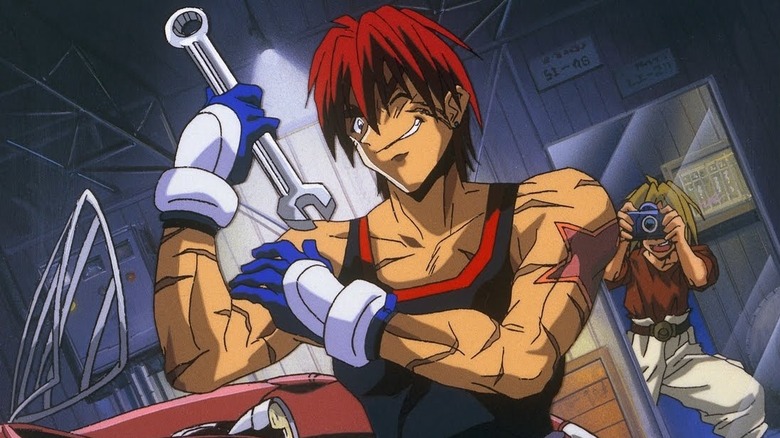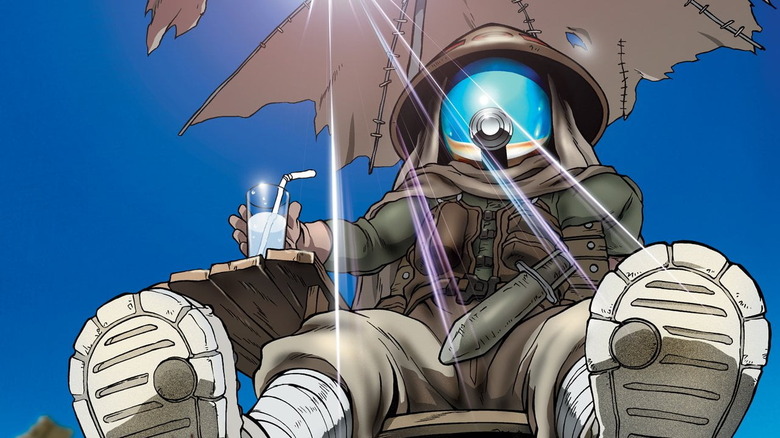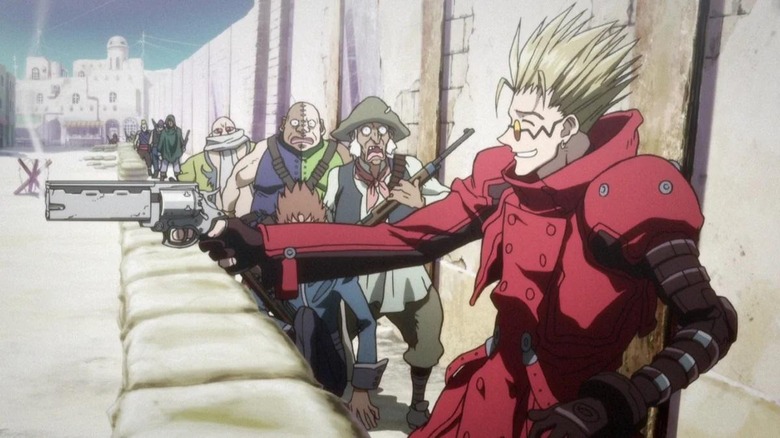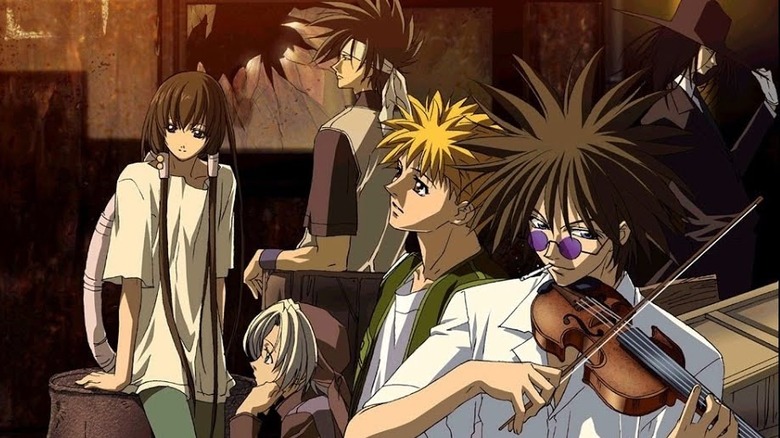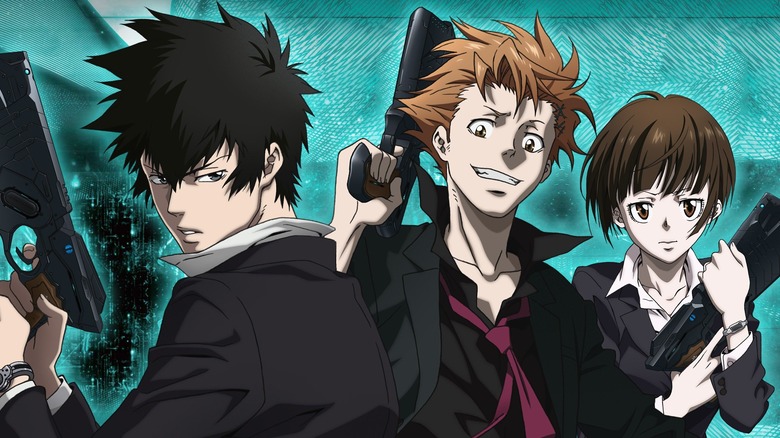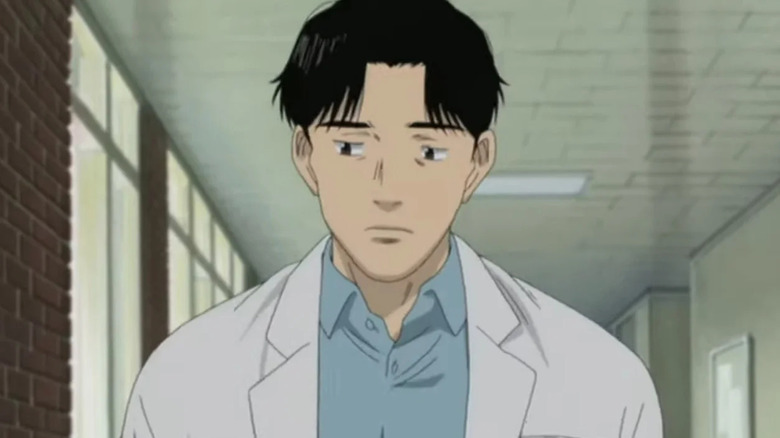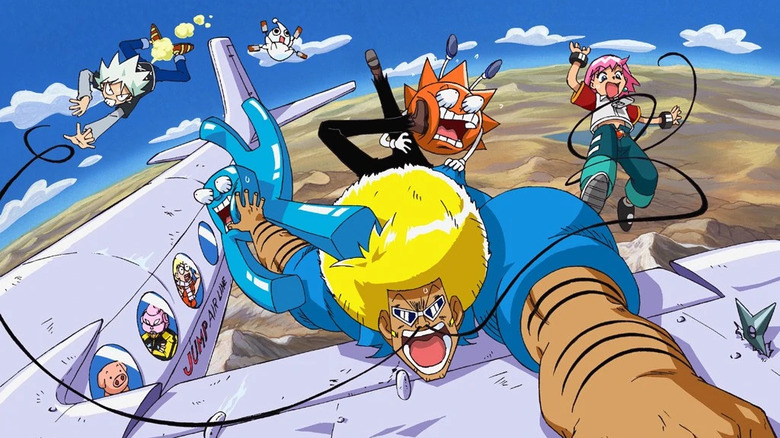Anime Shows Like Cowboy Bebop That Are Worth Your Time
If you were an unsuspecting late-night Cartoon Network viewer in 2001, you likely witnessed the birth of "Adult Swim." And, if you were there, then it is safe to say that one of your formative introductions to anime involved some loud horns blaring at the stroke of midnight, followed by the funkiest bass strings you'd ever heard. That's when you knew, deep down, that something different was happening.
"Cowboy Bebop" is, without question, one of the most highly regarded anime series of all time. With its rugged, quirky characters, fantastic animation, and epic score, the show has served as a welcome introduction to anime for many fans. Directed by Shinichiro Watanabe, "Cowboy Bebop" follows a crew of intergalactic bounty hunters as they travel across the galaxy aboard their ship, the Bebop, collecting bounties for the Inter Solar System Police. These assignments frequently land the team in chaotic situations that see their pasts coming back to haunt them, often with lethal results.
This eclectic fusion of noir, sci-fi, and westerns has even charmed Keanu Reeves, and that man is John Wick! There are just so many things to love about "Cowboy Bebop" — if you want more of them, the following anime series should help all you space cowboys scratch that itch. Okay, three, two, one ... let's jam!
Samurai Champloo
Shinichiro Watanabe's follow-up to "Cowboy Bebop," "Samurai Champloo," both harmonizes with and diverges from the high-octane space opera. This show tells a very different story, going back to the Edo period of Japanese history instead of the future. However, in spite of the drastically different settings, the series still follows a group of political outcasts who explore a fantastically dangerous world. "Samurai Champloo" tells the stories of Fuu, a tea waitress, Mugen, a rugged outlaw, and Jin, a lone samurai. This unlikely squad is formed under chaotic circumstances and ends up traveling across Japan on a quest to find "a samurai who smells of flowers."
"Samurai Champloo" is fantastical for a reason. While the setting may be an actual place and time, historical accuracy is deliberately thrown out the window. Why? Well, as Wanatabe explained in the "Cowboy Bebop" artbook "The Jazz Messengers" (via The Verge), he's interested in creating worlds where cultural minorities are accepted, thereby rejecting the nationalistic ideas that he sees as dangerous. The characters of "Cowboy Bebop" were also created with this concern in mind.
It's not a stretch to say that the relationship between these two series is emblematic of the relationship between jazz and hip-hop. The storytelling in "Samurai Champloo" is both incredibly distinct and yet so, so familiar. Even the choice of music in both shows directly mirrors not only how the two genres influenced each other, but how they are both emblematic of the counterculture. Stylistically, the two shows also challenge historical narratives in the same ways as some recent Hollywood films.
Space Dandy
On the other hand, if you still want to go on an adventure through space under the guidance of Shinichiro Watanabe's clever direction, "Space Dandy" might be the show for you. While the show's tone is much more comedic than that of "Cowboy Bebop," the stories are equally as outlandish and enjoyable. The anime follows Dandy, an alien bounty hunter who's joined on his missions by a cat-like alien named Meow and a quirky robot assistant called QT.
As a comedy, "Space Dandy" is quite episodic. At any given moment, one of the protagonists could wind up trapped in some sort of peril that ought to be inescapable. That said, this structure also allows the show to be incredibly expansive with its narrative ideas. "Cowboy Bebop" is similarly episodic, although the stakes are a little higher. Interestingly, fans of both shows have compiled quite a bit of evidence that they take place in the same cinematic universe.
Carole & Tuesday
If you are interested in how Watanabe would tell a story with a smaller scope, look no further than "Carole & Tuesday." This musical adventure follows Carole Stanley, a refugee from Earth, and Tuesday Simmons, a politician's daughter who has run away from home, as the two start a band on Mars in hopes of making it big. If you enjoyed the stunning sci-fi visuals of "Cowboy Bebop," you will be glad to know that the entirety of "Carole & Tuesday" takes place in Alba City, which also appears in "Cowboy Bebop: The Movie."
Unlike "Cowboy Bebop" and "Space Dandy," the plot of "Carole & Tuesday" is extremely serialized. For viewers who enjoy the crisp and fluid animation of "Cowboy Bebop" and "Space Dandy," but do not necessarily enjoy those shows' episodic structure, "Carole & Tuesday" could be a perfect fit.
Terror in Resonance
The final Watanabe-led production I'm including on this list is "Terror in Resonance," a thriller about the hunt for two teenage boys who steal an atomic bomb and threaten to destroy Tokyo unless their cryptic riddle is solved. Compounding this threat, these terrorists are also the products of a secret government experiment to develop human weapons. Throw in the unplanned involvement of Lisa, a schoolgirl who befriends the two teens, and this show has all the makings of a nail-biting thriller with many twists and turns.
Scored by Yoko Kanno, this gem captures the action and suspense that often lies just beneath the surface in "Cowboy Bebop." Additionally, its strict adherence to the crime thriller genre requires "Terror in Resonance" to follow a much more straightforward narrative path than "Cowboy Bebop." If "Carole & Tuesday" is a little too light-hearted for your taste but you still want to see what a Watanabe production looks like with a more serialized storyline, "Terror in Resonance" could be the show for you. It's been called one of the best anime series of the decade for a reason.
Black Lagoon
Moving on from Wanatabe's other projects, "Black Lagoon" provides the same kind of high-stakes, machine-gun-slinging criminal chaos found in "Cowboy Bebop." It follows the Lagoon Company, a motley crew of deadly mercenaries, over the course of their many misadventures in Roanapur, Thailand, which here is home to pirates, bandits, and all kinds of nefarious criminal enterprises.
On the team, you'll find Revy, a master gunfighter with a bad attitude, Benny, an expert computer scientist and researcher, and Rock, the group's face and its primary negotiator. Needless to say, moving goods in crime-infested Roanapur is not an easy job, especially when the "products" being transported range from drugs to weapons to hostages. If the nail-biting action and morally gray attitude towards the law is what attracted you to "Cowboy Bebop," check this out. "Black Lagoon" has both in droves.
Outlaw Star
"Outlaw Star" mirrors "Cowboy Bebop" in so many ways. It's definitely a space opera, complete with pirates, assassins, and bandits who wreak havoc across the galaxy in an unpredictable, lawless frenzy. Gene Starwind and James Hawking are two friends who operate a successful small business performing odd jobs. However, everything changes after a simple bodyguarding gig lands them inside a stolen spaceship. After naming this vessel Outlaw Star, the two head off in search of the Galactic Leyline, a "universal library" that the craft was specifically designed to search for.
It is no surprise key elements of "Outlaw Star" are so similar to those of "Cowboy Bebop" — "Outlaw Star" was released by the same production company, in the same year. Like "Bebop," it has a quirky crew of space travelers, as well as vast space empires that compete for limited resources. Arguably, this is as close to "Cowboy Bebop" as one can get without watching the real thing.
Desert Punk
If you're looking for a futuristic adventure comedy, "Desert Punk" is a solid option, even though it takes place in a post-apocalyptic wasteland, not outer space. In the wake of a nuclear catastrophe, Kanata Mizuno, better known as the mercenary Desert Punk, gets involved in various misadventures as he wanders the harsh landscape.
While the event that resulted in this lawless future may be fundamentally different from the intergalactic politics of "Cowboy Bebop," the show's protagonist is still attempting to navigate a world populated by corrupt governments and rugged individuals. The only real difference is that, in "Cowboy Bebop," humanity has expanded, while "Desert Punk" focuses on what's left of the human race. If you like "Cowboy Bebop," it's a good bet that you'll enjoy what this show has to offer, too. Be warned though — "Desert Punk" isn't afraid to get raunchy with its humor.
Trigun
Vash the Stampede is a famous deep-space gunman who resides on a planet named No Man's Land. He has a mysterious past, thanks to a case of retrograde amnesia resulting from a childhood trauma, and is constantly pursued by bounty hunters. As we get glimpses into Vash's past, it becomes increasingly clear that the source of his misfortunes doesn't only carry significant implications for our protagonist, but for the planet Gunsmoke itself.
What is perhaps most interesting about Vash is his pacifism. That's right! Vash is a notorious criminal who refuses to kill. The setting and action of "Trigun" evokes "Cowboy Bebop," and its style is especially notable for its futuristic mechanical designs. If "Cowboy Bebop" had more of the energy of a western, I think it would look a lot like "Trigun."
GetBackers
At first glance, "GetBackers" seems wildly different from "Cowboy Bebop." The main characters rely on superpowers more than guns. There is no cross-galaxy travel. The closest thing to a futuristic wasteland is a large cluster of condemned buildings. However, at the top of the Limitless Fortress lies a secret that challenges the characters' very perceptions of reality.
So many elements of this story mirror those of "Cowboy Bebop." "GetBackers" follows Ban Mido and Ginji Amano, who call themselves the GetBackers, as they run a freelance repossession service. The jobs that the two friends take are often unexpectedly perilous, and as the series goes on, viewers discover their mysterious pasts and get a feel for how lawless the world they operate in truly is. Like "Cowboy Bebop," an eclectic supporting cast quickly joins this quirky duo; there's even a jazz-inspired score, just like Wanatabe's space opera.
Psycho-Pass
Now that we've covered some shows that share the rugged energy of "Cowboy Bebop," let's look at series with the same noir vibes, starting with "Psycho-Pass." This anime takes place in a futuristic Japan and follows Akane Tsukemori, a rookie law-enforcement officer. Akane is an Inspector, or someone who evaluates crime scenes under the protection of the Enforcers, who are tasked with carrying out the Inspectors' instructions, and who are at risk of becoming criminals themselves.
Those who enjoy "Cowboy Bebop" for its sci-fi elements are sure to enjoy "Psycho-Pass." In this future, every individual's potential for committing crimes is decided by an algorithm, which law enforcement officials use to apprehend crooks before they cause damage. As is normal with this kind of premise, the series is ripe for an analysis of not only how the law is enforced, but also of who, exactly, is having their rights infringed on. Like"Cowboy Bebop," "Psycho-Pass" is provocative, thrilling, and philosophically deep.
Monster
Speaking of philosophical depth, let's go even deeper with our next recommendation, which happens to be one of the best-selling manga series of all time. At first glance, "Monster" seems like the exact opposite of "Cowboy Bebop," but over time the story becomes just as nail-biting and morally challenging. In it, we follow Kenzo Tenma, a brain surgeon who's disgraced after he saves the life of a young boy instead of the mayor. When the doctors who urged him to ditch the child are mysteriously murdered, Tenma finds himself in the center of a chilling mystery.
Emotionally, this thriller about the medical industry is notably understated, but "Monster" has gained so much notoriety as a crime thriller that even A-list filmmakers like Guillermo del Toro are itching to adapt it to live-action. But why is it on this list? Well, "Cowboy Bebop" fans who enjoy analyzing the series' meaning may find the same thrills here. Both series have been praised for their psychological depth; the shows' genres are different, but the experience of watching them is very similar.
Bobobo-bo Bo-bobo
Stick with me on this one. At first, "Bobobo-bo Bo-bobo" feels like it couldn't be more different from "Cowboy Bebop." It doesn't have the coolest animation. It didn't receive critical acclaim. Attempts at genuine and thorough analysis of its characters would likely be met with relentless ridicule.
In this series, we follow Bobobo-bo Bo-bobo on his quest to stop the tyrannical Chrome Dome Empire and their evil head-shaving practices. To do so, Bo-bobo teams up with the stereotypical heroine Beauty, rowdy teen Gasser, and insufferable narcissist Don Patch, and makes spectacular use of his nose-hair-based martial arts.
Thematically, "Cowboy Bebop" and "Bobobo-bo Bo-bobo" are nothing alike. "Bobobo-bo Bo-bobo" is a parody of every genre of anime, and never strays from its breakneck pace. However, the cast is similarly quirky, and its chaotic lawlessness reaches levels so extreme that the entire concept of narrative itself seems about to burst at the seams. If you pushed the comedic elements of "Cowboy Bebop" to their furthest limits, you'd get "Bobobo-bo Bo-bobo."
